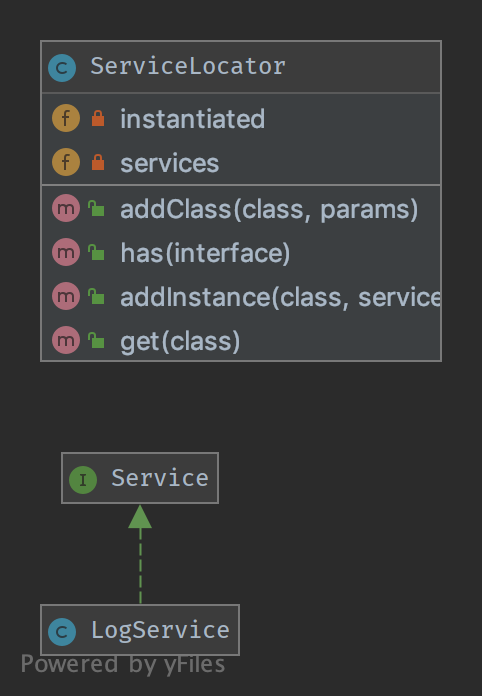4.1. Service Locator
THIS IS CONSIDERED TO BE AN ANTI-PATTERN!
Service Locator is considered for some people an anti-pattern. It violates the Dependency Inversion principle. Service Locator hides class’ dependencies instead of exposing them as you would do using the Dependency Injection. In case of changes of those dependencies you risk to break the functionality of classes which are using them, making your system difficult to maintain.
4.1.1. Amaç
Daha iyi test edilebilir, bakım yapılabilir ve genişletilebilir kod elde etmek için gevşek bağlı bir mimari uygulamak. Hizmet Bulucu ve Bağımlılık Aktarımı (Dependency Injection) desenleri, Ters Denetim (Inverse of Control) deseninin bir uygulanımıdır.
4.1.2. Kullanım
ServiceLocator ile, belirli bir arayüz için bir hizmet kaydı yapabilirsiniz. Bu arayüzü kullanarak hizmete erişebilir ve hizmetin uygulanımını (implementation) bilmeksizin uygulama sınıflarında kullanabilirsiniz. ServiceLocator nesnesini önyüklemede (bootstrap) yapılandırabilir ve aktarım (injection) yapabilirsiniz.
4.1.3. UML Diyagramı

4.1.4. Kod
Bu kodu Github üzerinde de bulabilirsiniz.
Service.php
1<?php
2
3namespace DesignPatterns\More\ServiceLocator;
4
5interface Service
6{
7}
ServiceLocator.php
1<?php
2
3declare(strict_types=1);
4
5namespace DesignPatterns\More\ServiceLocator;
6
7use OutOfRangeException;
8use InvalidArgumentException;
9
10class ServiceLocator
11{
12 /**
13 * @var string[][]
14 */
15 private array $services = [];
16
17 /**
18 * @var Service[]
19 */
20 private array $instantiated = [];
21
22 public function addInstance(string $class, Service $service)
23 {
24 $this->instantiated[$class] = $service;
25 }
26
27 public function addClass(string $class, array $params)
28 {
29 $this->services[$class] = $params;
30 }
31
32 public function has(string $interface): bool
33 {
34 return isset($this->services[$interface]) || isset($this->instantiated[$interface]);
35 }
36
37 public function get(string $class): Service
38 {
39 if (isset($this->instantiated[$class])) {
40 return $this->instantiated[$class];
41 }
42
43 $object = new $class(...$this->services[$class]);
44
45 if (!$object instanceof Service) {
46 throw new InvalidArgumentException('Could not register service: is no instance of Service');
47 }
48
49 $this->instantiated[$class] = $object;
50
51 return $object;
52 }
53}
LogService.php
1<?php
2
3declare(strict_types=1);
4
5namespace DesignPatterns\More\ServiceLocator;
6
7class LogService implements Service
8{
9}
4.1.5. Test
Tests/ServiceLocatorTest.php
1<?php
2
3declare(strict_types=1);
4
5namespace DesignPatterns\More\ServiceLocator\Tests;
6
7use DesignPatterns\More\ServiceLocator\LogService;
8use DesignPatterns\More\ServiceLocator\ServiceLocator;
9use PHPUnit\Framework\TestCase;
10
11class ServiceLocatorTest extends TestCase
12{
13 private ServiceLocator $serviceLocator;
14
15 public function setUp(): void
16 {
17 $this->serviceLocator = new ServiceLocator();
18 }
19
20 public function testHasServices()
21 {
22 $this->serviceLocator->addInstance(LogService::class, new LogService());
23
24 $this->assertTrue($this->serviceLocator->has(LogService::class));
25 $this->assertFalse($this->serviceLocator->has(self::class));
26 }
27
28 public function testGetWillInstantiateLogServiceIfNoInstanceHasBeenCreatedYet()
29 {
30 $this->serviceLocator->addClass(LogService::class, []);
31 $logger = $this->serviceLocator->get(LogService::class);
32
33 $this->assertInstanceOf(LogService::class, $logger);
34 }
35}